|
Treachery
Tovarich!
22
March 2003
by
Peter Hunt
If you are not confused you don’t understand the situation”.
Whilst this aphorism was true of many wars it was especially suited to the
variety of participants and complicated series of alliances and motives
that marked the Russian Civil War. This confusion was well demonstrated at
the little battle of Vanzhai Junction that took place in the war’s third
year, deep in the
Ukraine
.
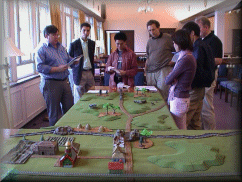 The
terrain around Vanzhai is marked by light woods and rolling hills and
resembles a letter “T”. The main east-west road runs up the leg of the
“T” which is then capped by the north-south railway. At the junction
stands Vanzhai itself, a collection of hovels and warehouses, and, of
course a church. It was the warehouses that brought the war to this quiet
spot. The
terrain around Vanzhai is marked by light woods and rolling hills and
resembles a letter “T”. The main east-west road runs up the leg of the
“T” which is then capped by the north-south railway. At the junction
stands Vanzhai itself, a collection of hovels and warehouses, and, of
course a church. It was the warehouses that brought the war to this quiet
spot.
The
Whites, backed by Interventionist French forces, had exploited the toil of
the masses and brought in all the harvest from the surrounding countryside
and stored it in the village prior to selling it to the Polish
Interventionist forces. This was a cash-on-delivery transaction. A Polish
motorized convoy would proceed up the road, load up in the village and
then return. Taking with it the grain and potatoes, which should have seen
the peasants of the district through the harsh winter, to convert into
vodka to fuel the fleshpots of
Warsaw
.
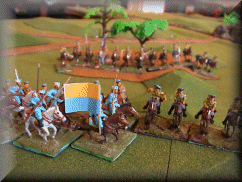 Hearing
of this theft, Nestor Makhno, (played with great panache by Jeff,) pulled
together a loose alliance of Reds, Ukrainian nationalist and his own
anarcho-syndicalist bands. His aim was to stop the convoy, or, better
still, take Vanzhai and liberate the harvest. In true anarchist style
Nestor dismissed any concept of a coordinated attack as a symptom of
bourgeois militaristic thinking that should be consigned to the dustbin of
history. Consequently the leftists made a series of randomly timed and
directed thrusts against the road and the village. Hearing
of this theft, Nestor Makhno, (played with great panache by Jeff,) pulled
together a loose alliance of Reds, Ukrainian nationalist and his own
anarcho-syndicalist bands. His aim was to stop the convoy, or, better
still, take Vanzhai and liberate the harvest. In true anarchist style
Nestor dismissed any concept of a coordinated attack as a symptom of
bourgeois militaristic thinking that should be consigned to the dustbin of
history. Consequently the leftists made a series of randomly timed and
directed thrusts against the road and the village.
First
up was Hetman Ken leading the Ukrainian cavalry. As he entered on the side
of the “T’s” leg the battlefield appeared empty. The Hetman favoured
a cautious approach but, goaded on by Nestor, he decided to immediately
cut the road instead. For a brief moment he stood in triumph on both sides
of the road. Then he discovered that the enemy had indeed been slaves to
militaristic dogma and had deployed their troops hidden in the many woods
and hills near the road. As a result Ken was caught in a crossfire from
several woods occupied by Generals Frank and Dick, and the approaching
convoy led by Andrzej. Charged in the flank, surrounded and outnumbered,
Ken went down fighting, and managed to inflict some losses on the convoy
before the inevitable end.
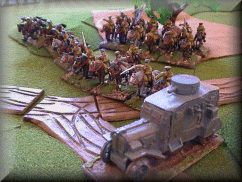 Next
Commissar Pityor leading the Red naval brigade and workers moved against
the village from the edge of the cap of the “T”. Using high ground to
cover his approach he moved cautiously. Thus he was unable to prevent the
Polish convoy entering the village but at least Pityor was able to take
the hill that dominated the road with no losses. This happy situation did
not last long however as the houses opposite him were garrisoned by French
Interventionists under Commandant Paul who, with the advantage of cover,
training and target practice quickly shot the advancing Reds to pieces. Next
Commissar Pityor leading the Red naval brigade and workers moved against
the village from the edge of the cap of the “T”. Using high ground to
cover his approach he moved cautiously. Thus he was unable to prevent the
Polish convoy entering the village but at least Pityor was able to take
the hill that dominated the road with no losses. This happy situation did
not last long however as the houses opposite him were garrisoned by French
Interventionists under Commandant Paul who, with the advantage of cover,
training and target practice quickly shot the advancing Reds to pieces.
Whilst
this was going on Ken’s more left wing cousin had appeared over the
battlefield flying the Makhnovite’s only aeroplane. A quick
reconnaissance showed that must of the rightists were still deployed in
cover so Ken recovered some family pride by turning his Vickers on the
convoy and Frank’s cavalry left in the open.
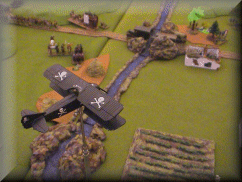 Finally
the leftists seemed to get their act together. Almost simultaneously
Commissar Kris and his Reds arrived at the cap of the “T” on the
opposite side of the village to Pityor, whilst the Makhovites under Nestor
and Phillipe arrived, together and in force, on the leg of the “T”. At
the village Kris’s arrival brought forth a withering fire from more
Poles hidden in the village itself and the femme fatale Andrilea emerged
from the woods to counterattack Kris’s flank. Thus Kris’ attack
stalled and he was unable to prevent the convoy loading up. However as the
convoy drove out of the village it masked the fire of the French
Interventionists. This allowed Pityor’s sailors both to extricate
themselves from the killing ground on the hill and to pour a devastating
fire into the convoy as they withdrew, knocking out one of the vehicles. Finally
the leftists seemed to get their act together. Almost simultaneously
Commissar Kris and his Reds arrived at the cap of the “T” on the
opposite side of the village to Pityor, whilst the Makhovites under Nestor
and Phillipe arrived, together and in force, on the leg of the “T”. At
the village Kris’s arrival brought forth a withering fire from more
Poles hidden in the village itself and the femme fatale Andrilea emerged
from the woods to counterattack Kris’s flank. Thus Kris’ attack
stalled and he was unable to prevent the convoy loading up. However as the
convoy drove out of the village it masked the fire of the French
Interventionists. This allowed Pityor’s sailors both to extricate
themselves from the killing ground on the hill and to pour a devastating
fire into the convoy as they withdrew, knocking out one of the vehicles.
Meanwhile,
on the leg of the “T”, Nestor and Phillipe exploited their numerical
superiority against Frank’s cavalry. Although in a series of charges and
countercharges the White horsemen put up a good show, they could not hold
out in long enough for Dick’s infantry to come to their help. Their fate
was finally sealed by another 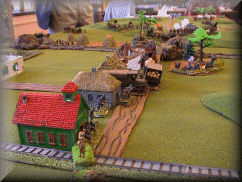 strafing attack by aviator Ken. Phillipe
even managed to get the returning convoy in the sights of his artillery
only to find that Nestor was just as weak at logistics as he was at
strategy. Instead of blowing away the convoy’s vehicles one-by-one the
Makhnovist gunners could just look on impotently as their ammunition ran
out. Even so Nestor was firmly astride the road and the battered convoy
looked as if it would not be able to fight its way though his cavalry.
Sensing the final victory of the masses he drew his sabre, squared his
shoulders, stood up in the stirrups and looked over his shoulder…only to
see his men streaming away from the battlefield. The leftists’
cumulative losses in their uncoordinated attacks had been too much for
their simple peasant, worker and sailor spirits. They had broken at the
possible moment of victory. Sadly Nestor turned and followed his fleeing
bands. The cruel war would continue and it would be a hungry winter for
the people of Vanzhai. strafing attack by aviator Ken. Phillipe
even managed to get the returning convoy in the sights of his artillery
only to find that Nestor was just as weak at logistics as he was at
strategy. Instead of blowing away the convoy’s vehicles one-by-one the
Makhnovist gunners could just look on impotently as their ammunition ran
out. Even so Nestor was firmly astride the road and the battered convoy
looked as if it would not be able to fight its way though his cavalry.
Sensing the final victory of the masses he drew his sabre, squared his
shoulders, stood up in the stirrups and looked over his shoulder…only to
see his men streaming away from the battlefield. The leftists’
cumulative losses in their uncoordinated attacks had been too much for
their simple peasant, worker and sailor spirits. They had broken at the
possible moment of victory. Sadly Nestor turned and followed his fleeing
bands. The cruel war would continue and it would be a hungry winter for
the people of Vanzhai.
Kris,
ever the opportunist, attempted to change sides, but his timing was poor,
having given such a hard time to the Poles defending the village, he was
shot out of hand. There
was, of course, the usual session of self-criticism after the battle.
Nestor and Ken did the decent thing and ended everything with a single
bullet. Phillipe and Pityor were less noble and fled with whatever
they could lay their hands on. Remarkably they all ended up as waiters in
Paris
after the war. When they tired of simple pleasures like gobbing in the
bisque of their capitalist clientele: “more cream Monsieur?” they
would occasionally meet up and, over pyrogi and vodka think back to that
autumn day in the Ukraine
. . . what if? what if?
back to world war I
|